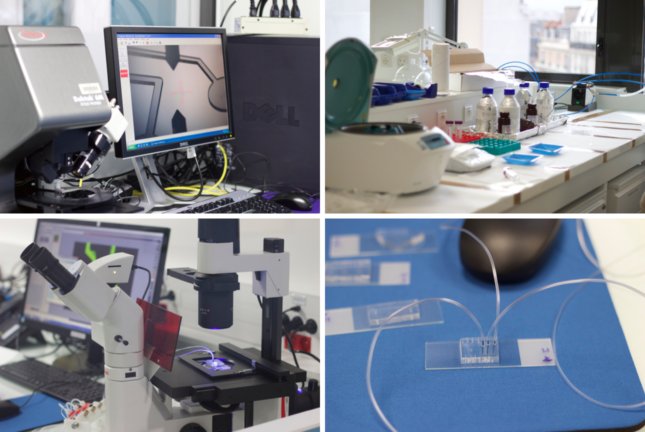English
The Master in Microfluidics (Master 2) is an interdisciplinary program supported by the Institut Pierre-Gilles de Gennes (IPGG).
It is oriented towards innovation, research, and industrial applications, and offers one of the fastest ways to connect with the start-up ecosystem in the field of microfluidics.
This program is part of two internationally recognized Master’s degrees:
- Physics of Complex Systems (Sorbonne Université, Université Paris Cité, Université Paris-Saclay) – for students with a physics background.
- Materials Science and Engineering (Université PSL) – for students with chemistry or biology backgrounds.
Why join the Microfluidics program?
The program provides a unique combination of advanced scientific training, cutting-edge research experience, and exposure to innovation.
Two key strengths define the student experience:
- Excellence in academic teaching with a highly interdisciplinary curriculum.
- Hands-on research & technological training, directly linked to academic labs and industrial innovation.
Students are trained to think like scientists and engineers while solving real-world problems. They benefit from:
- A faculty of internationally recognized experts
- Access to state-of-the-art research platforms
- A strong culture of innovation through collaborations with start-ups and incubators
A unique location
Student life takes place in the heart of Paris, within the Latin Quarter – a historical hub of French science.
The IPGG campus is within walking distance of world-class institutions such as:
- Sorbonne Université
- Institut Curie
- École Normale Supérieure
- Chimie ParisTech
- ESPCI Paris
This geographical concentration fosters constant interdisciplinary exchange.
Paris itself is a thriving multicultural hub of innovation and research, offering direct access to Université Paris-Saclay, Université Paris Cité, and innovation clusters.
Curriculum Overview
The program runs from September to June/July and is worth 60 ECTS.
- Courses (30 ECTS) → Core & specialized classes in physics, chemistry, biology, and engineering.
- Research Project (3 ECTS) → A first-semester project in an IPGG lab.
- Master’s Thesis & Internship (30 ECTS) → A 5–6 month research internship, defended before a jury.
Core Topics
Technology
- Micro- and nanofabrication: silicon, PDMS, plastics, flexible electronics
- Surface functionalization (molecular & biomolecular methods)
- Characterization: microscopy, flow cytometry, rheology, single-molecule imaging
Physics
- Hydrodynamics at the microscale, nanofluidics
- Capillarity, wetting, soft matter & interfaces
Lab-on-a-chip
- Continuous & segmented flow chemistry
- Bioassays & analytical microdevices
Biology & Biochemistry
- Droplet-based biochemistry & single-cell analysis
- Single-cell & collective cell behavior in microdevices
- Organ-on-chip approaches
Hands-on Training
From the very start, students receive intensive lab training on the IPGG technological platform, learning to design, fabricate, and manipulate microfluidic devices.
This foundation is reinforced by:
- A short research project in semester 1.
- A Master’s thesis (30 ECTS) in semester 2, carried out in academia or industry, in France or abroad.

Innovation & Industry Connection
Microfluidics is a driver of deep-tech entrepreneurship.
The program benefits from strong ties with innovation clusters:
- PC’Up incubator
- Tremplin Carnot IPGG TT office
Students meet start-ups and industrial partners during regular events, and many companies have directly emerged from IPGG labs.
Faculty
Teaching is provided by leading researchers from across Paris, including:
- Institut Curie: M. Thery, P. Silberzan, B. Hajj, S. Descroix, S. Coscoy, L. Muller
- Sorbonne Université: H. de Maleprade
- ENS Paris-Saclay: B. Le Pioufle, K. Perez-Totalla
- ESPCI Paris: N. Brémond, D. Quéré, C. Trégouet, M. Ardre, J. McGraw
- Chimie ParisTech: M. Tatoulian, S. Ognier
- École Normale Supérieure: M. Morel, J. Fattaccioli
- Université Paris Cité / Paris Diderot: A. Lindner
- Université Paris-Saclay: B. Le Pioufle
Useful Links
- Official website: microfluidics-master.fr
- Institut Pierre-Gilles de Gennes: ipgg.fr